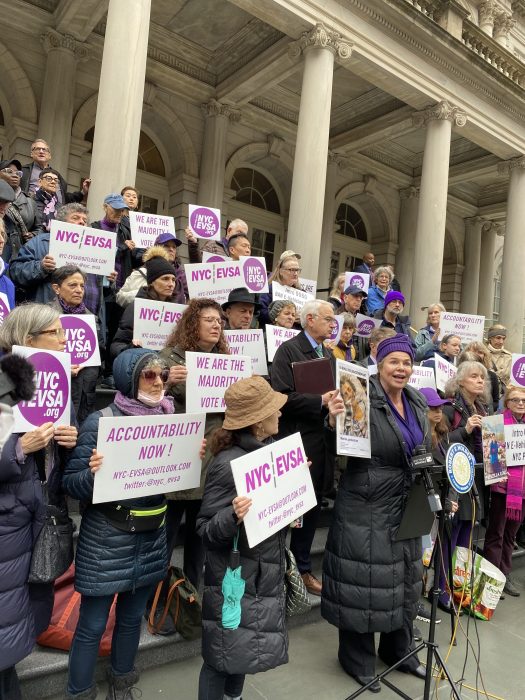Dozens of New Yorkers fed up with reckless e-vehicle riders gathered outside City Hall on Wednesday, demanding licenses for mopeds and e-bikes in NYC.
Queens City Council Member Robert Holden spotlighted his 2023 bill, Priscilla’s Law, named after Priscilla Loke, who died after being struck by an e-bike in Manhattan’s Chinatown while on her way to work last year.
The legislation would require the city’s Department of Transportation (DOT) to register and license all e-mobility devices not regulated by the state Department of Motor Vehicles (DMV).
To Holden, the bill is about accountability. If it passes, the law would make e-vehicle riders more accountable when collisions occur.
A ‘long overdue’ bill
Here’s how the law would work: When drivers register with the NYC DOT, their e-vehicle receives an identifying number to display on a visible plate affixed to the e-bike, moped or similar device. This, Holden explained, would allow greater accountability in cases of traffic violations, accidents or unlawful activity.
“This bill is long overdue,” the council member said. “Other cities around the world have done this. Some cities even ban e-bikes from their downtown areas because they know the danger. And to get them to stop, you need accountability.”
Holden, who later testified before the City Council’s Transportation Committee in support of the bill, said e-vehicles make navigating the streets and sidewalks of NYC a dangerous challenge.
“I always say that the most dangerous place to be in NYC is a crosswalk because you don’t know what’s coming at you,” he said. “You don’t know which direction. You have to have eyes in the back of your head.”
Many elected officials and road safety advocates say the impact of e-bikes has outpaced current state and city regulations. In fact, e-bikes cause 19 times more deaths per vehicle than regular bicycles, according to a 15-page report by Manhattan Assembly Member Alex Bores last year—though, as expected, the report notes that cars are the riskiest on a per-vehicle basis.
Janet Schroeder, co-founder of the NYC E-Vehicle Safety Alliance (EVSA), supports the proposed law. She said her group is not against e-vehicles, but wants more rider accountability.
“We are pro-safety for all,” she said. “We are an unpaid and unfunded group of volunteers that represent the majority voice in our city. Our only agenda is safety for all New Yorkers. Priscilla’s Law, requiring visible license plates on e-vehicles will create accountability for riders, because consequence is what shapes behavior. This legislation will save lives and mitigate injuries for pedestrians, cyclists and e-bikers.”

Andrew Fine, a member of the alliance, said he has been fighting alongside others to get the bill passed for over a year. So far, a majority of the city council has co-sponsored it, he added.
“It’s vital to create accountability for e-bikes, which are running wild on our streets, injuring, maiming and hurting people on a minute-to-minute basis,” Fine said.
Other New Yorkers expressed frustration at the lack of enforcement of reckless e-vehicle riders, while some see the battery-powered e-mobility devices as a convenient way to get around the city.
“I think they need to be registered with insurance,” New Yorker Derek James said. “I see them up and down the roads not obeying traffic laws at all and have almost caused many accidents for me. I’d love to see them gone.”
James is also concerned about another danger — specificallly, the fire risk posed by faulty lithium-ion batteries that give the vehicles their power.
“Not to mention the fires, lack of regulation on the companies who distribute them and how many homes are lost. I’m sure it’s causing home insurance price hikes,” he said.
Concerns about the bill
However, New Yorker Amber Rose, with a slightly different viewpoint, said not every e-vehicle rider is reckless or breaks the law.
“A lot of people use these vehicles to commute to work and such,” she said. “Yes, there are people that abuse them, but those people that abuse them should pay the consequences of not having respect for the road. I can say that this is a reliable way of transport better than paying for car insurance and gas. Again there are good and bad drivers in all stages of transportation.”
Andrew Rigie, executive director of the NYC Hospitality Alliance, a nonprofit representing thousands of restaurants across the city, expressed concerns about the bill to the city council on Wednesday.
Restaurants that employ their own delivery staff, rather than a third-party company like Uber Eats, already have to abide by existing mandates in place that help identify each bike, he explained.
“For example, current regulations require restaurants to assign delivery cyclists a unique three-digit ID number, which must be displayed on retro-reflective upper-body apparel that includes the business name,” Rigie said. “Also, each bicycle used for deliveries must have a unique ID number—distinct from the cyclist’s ID number—clearly affixed to the rear of the bicycle, the bicycle seat, or both sides of the delivery basket.”
He added that it is unclear how introducing another mandate would help with street safety.
“What is certain, however, is that it will impose additional financial and administrative burdens on small businesses, requiring them to file more paperwork and pay fees to register their e-bikes,” he said.
Meanwhile, many New Yorkers see the Big Apple as the Wild West because of too many reckless e-vehicle riders and not enough oversight or regulation.
Ellen Cavanaugh Benson, who works in Brooklyn, is tired of near-miss encounters with e-bikes on when she is on a sidewalk.
“I work in a highly populated area of Brooklyn and have nearly been knocked over after simply turning a corner while walking to my car,” she said. “The drivers are careless and reckless.”






































